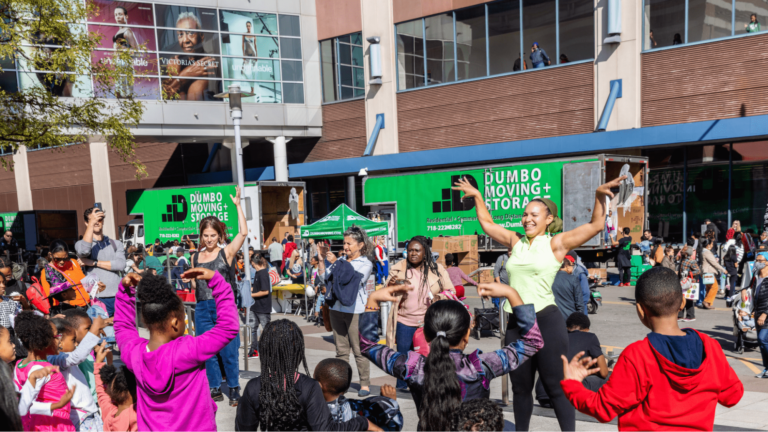Snagging a sponsor can take your event to the next level and create future opportunities for expansion – but many event organisers hit a wall when trying to find and nurture potential sponsors. Event sponsorship drives brand engagement with 98% of consumers, so you really want to get it right.
We sat down with Matt Tuffuor, Global Community Marketing Manager at Eventbrite and co-founder of Toasted Life, and Emily Kessler, Partner and Manager at The Big Quiet, for some expert tips.
Whether you’re looking for large corporate sponsorship for a charity or local sponsors for a small community event, the same principles apply. The key to attracting sponsors is creating a valuable offer in return. The more attractive you make this reward, the more sponsors are likely to want to work with you.
In this guide, we’ll show you how to get great event sponsorship for any event.

What is event sponsorship?
Event sponsors pay to support an event in exchange for exposure and branding opportunities. Sponsors seek to align their brand with the event’s audience and objectives.
They may also receive exclusivity in their industry or product category, as well as the right to use the event’s logo and imagery in their marketing.
Sponsors can contribute to a variety of events, including trade shows, conferences, festivals, and sporting events. In return, event organisers work to promote the sponsor’s brand before, during, and after the event through advertising, signage, digital promotion, and other means.
When it comes to sponsors, there are four types:
- Cash sponsorship: A brand provides money to an event creator in exchange for publicity and awareness
- In-kind sponsorship: A brand offers products or services for an event
- Product sponsorship: A business supplies the event with products in exchange for publicity
- Strategic partnership: A brand provides long-term support to an event; this typically involves a partnership agreement
Does your event need a sponsor?
Depending on the type of event, you’ll probably need a sponsor. Sponsors can provide lots of benefits, like financial support. They can help fund the event and cover expenses such as venue rental, marketing, staffing, and food. Partnering with brands also helps you gain exposure to a wider audience. With a greater buzz, you’ll attract more attendees.
Access to specific audiences
Events are good at bringing people together who share a common interest. Through sponsorships, brands can tap into a target audience. This is especially useful for advertising to clients a company wouldn’t otherwise reach.
Brand awareness
Event sponsorship allows businesses to advertise their name, products, and services. Like TV ads and billboards, displaying your branding across a festival can generate leads.
Brand credibility
People notice if a business volunteers at a fundraiser or supports community events. Sponsorships increase a company’s corporate social responsibility (CSR).
Shared publicity
You and your sponsors can share mutual benefits by partnering. This can be especially true when partnering with a local business. For example, a local bookstore at a festival attracting thousands provides the experience of a unified community front for all involved.
Recruit new employees or community members
Through sponsorship opportunities, brands can advertise partnering and job opportunities to the public. This reduces the time and money spent on recruiting.
Choosing the right sponsor for your event
The ideal sponsor will be as excited to work with you as you are to work with them. Sometimes, they’re right around the corner from you; other times, it takes some digging to find them. Use these proven methods to make the search easier:
Identify your audience
To find sponsors that fit your audience, learn about your attendees — their interests, key behaviours, and spending habits. There are several places to start mining this information:
- Your event ticketing platform: Depending on the information attendees provide when registering, you already have a built-in database of demographics.
- Tracking technology: Who’s visiting your website? Technologies like Google Analytics will tell you where they live, what sites they visit, and where they land on your site.
- Social media: If you advertise on Twitter, Facebook, or Instagram, you have access to lots of data. Facebook’s “Audience Insights,” for example, can tell you what pages your target audience has liked and how they spend their money online. Use Eventbrite’s Marketing Platform to make this process more streamlined.
Looking at these various sources of data, you might learn information like this:
- More than half of your target audience likes Amazon’s Facebook page — so Amazon (or one of its competitors) would be a smart sponsor.
- Your followers tend to like winery pages — so a wine shop would be a good fit.
- 70% of those who clicked on your ad live within a single city — so if you want a local sponsor, you should concentrate on a sponsor from that area.
This data is pure gold — it can help you create a razor-sharp pitch for sponsors and create a targeted plan for your event and event marketing.

Find brands that align with your fans
You want to choose a sponsor that has similar values to your event. This creates a more genuine experience for attendees, increases brand loyalty, forms lasting partnerships, and ensures the sponsor’s message resonates. It will also help your vision come to fruition.
“Don’t let the sponsor derail your plans or change the vision for your experience just because they have the funding you may need,” advises Tuffuor.
Kessler encourages creators to align with brands that support their purpose. She says, “We like to work with brands that feel really authentic to who we are and what we do.”
Make a broad list of the types of companies that align with your fans’ expressed interests, and mark them as potential partners.
For example, if your attendees like camping, include outdoor retailers on your list. If they express an interest in luxury travel, spas and resorts should be on the table; if they show an interest in art, local galleries and supply stores will be good options.
Then, get specific. Start making a list of brands you’d like to approach. You might know that you want to woo breweries, for instance — but which ones? One way to filter is by browsing social media to determine which of these breweries would resonate with your attendees. What brands are trending? Does one specialise in gluten-free beer?
Research companies and similar events
Once you have a list of organisations, start digging deeper. Scroll through their socials and check their websites. What topics do they promote? Have they sponsored events before? Add a check to potential leads.
Then, work in reverse. Look up events like yours and find out who sponsored them. There’s a good chance your event will also interest those companies.
What questions should you ask a sponsor?
Here are a few questions to help you find the ideal sponsor:
- What audience is the sponsor hoping to reach?
- What kind of visibility/branding can the sponsor expect?
- How much funding or in-kind support is the sponsor offering? Are there any restrictions on the use of the funds or in-kind support?
- How much autonomy will the event organisers have in terms of planning and execution of the event?
Expert tips for attracting event sponsors
Now that you know which sponsors to aim for, how do you get them to sponsor your event? With the help of Toasted Life and The Big Quiet, we’ve compiled a list of expert tips that’ll allow you to snag sponsors for your event.
Tighten your brand image and make it easy to find
Your potential sponsors will do some digging, so this is the time to make a killer first impression.
What advice did Matt Tuffuor at Toasted Life give? “You only get one shot to impress your sponsors, so spend some time cleaning up what you can control online,” he says. Tuffuor suggests doing an online audit of your brand – including Google images and recent press.
Use the power of your network
Before you send out a bat signal for all sponsors, check with your personal and professional network.
Emily Kessler from The Big Quiet taps into her own social circle when looking for sponsors. “I think having personal contacts and relationships is really important, as many companies have lots of levels to get to a decision-maker,” she says.
Believe in what you’re offering
The more passion you pour into your event or cause, the more sponsors will want to get on board. Take some time to figure out your “why”. Once you flesh out the purpose, you’ll be able to communicate the benefits of your event to sponsors.
Check out who’s sponsoring what
Take a peek at your competition and see who’s sponsoring them. Targeting these brands is a no-brainer because they are already interested in supporting similar events.
Another benefit? “These sponsors may also have clearer objectives and learnings that can be leveraged by you,” Tuffuor says.
Spend time on your event listings
Your event listing is your chance to sell your event to attendees and sponsors. Ensure you include as much information as possible and follow event listing best practices. This could mean adding high-quality photos, videos, and a catchy event description. Ensure the tone of your listing aligns with the brand voice of the sponsors you want to attract.

Nailing your sponsorship proposals
Writing event sponsorship proposals can be a make-or-break opportunity. Make your proposal compelling and persuasive, and communicate the value of your event to sponsors. Don’t know where to start? These tips can help.
Create customised decks
Create a sponsorship proposal tailored to each potential sponsor. Your proposal should outline your event – in relation to them and their values. To drive home the message, include how your event will help support their brand. Don’t forget to include your history, like key performance indicators and testimonials.
Consider an advisory board
Add some muscle power with an advisory board. This strengthens your credibility with potential sponsors and shows you mean business. If you don’t have the personnel on your existing team, no problem.
Tuffuor says that surrounding yourself with expert advisors is enough to impress sponsors and make them want a piece of the action.
Improving your sponsorship packages and benefits
To reel in sponsors, you have to make the offer juicy. Below are a few ways to sweeten the deal.
Don’t just chase money
Sponsors can offer more than financing. In-kind sponsorship is just as valuable and can help your event run smoothly. For instance, giving away sponsored products at your event could help drive attendance and give you more leverage when setting ticket prices.
Get creative with your marketing real estate
Don’t be afraid to think outside the box when displaying your sponsor’s logo. What’s the most unique tactic Tuffuor has witnessed? “I’ve even seen bars etch […] ice cubes in attendees’ cups with sponsors’ logos,” he says. There’s no limit to the brand activations you can use at your event.
What should you offer your event sponsors?
Sponsors want to know what’s in it for them. Offer potential sponsors exposure to a wide audience, including advertising space or product placement. Or, offer sponsors the chance to generate leads and customers by providing exclusive discounts on products and services.
Whatever your offer, it must be something your potential sponsor can’t resist. For more ways to appeal to sponsors, check out our guide for spotlighting sponsorships.
Sponsors love registration data
More tangible things like attendee demographics and engagement metrics are enticing offers for sponsors. With Eventbrite, you can collect as much data from customers as possible. For instance, if you’ve secured a sponsorship with a watch brand, you can add customised checkout questions like “Are you in the market for a new watch?”
Making contact with event sponsors
You’ve identified potential sponsors and laid out the benefits your event can bring them – but how can you get in contact? Below are tips to help to reach out to sponsors and make an excellent first impression.
Patience is key
Getting sponsorships can take time. Your potential partners need to evaluate the value of your offer and make a decision. They may need to secure a budget and get internal approval. We recommend reaching out to potential sponsors as early as possible – ideally 6–12 months before your event.
Leverage LinkedIn
Scour LinkedIn for titles such as Sponsorship Manager, Brand Manager, or Regional Marketing Manager. Try to get into the right inbox, but don’t lose hope if you don’t get a response. Once you’ve scored the right contact, send personalised sponsorship emails to grab their attention.
Research your recipient
So that your message stands out, do some research and customise your message. Avoid stock phrases like “hope you’re doing well”, as this can seem insincere.
Instead, include a sentence or two that shows you’re familiar with the recipient’s company or role. For inspiration, check out these 8 email templates for event sponsorships.
Securing sponsorship for an event
After you’ve found your perfect match and the sponsor is keen to sponsor your event, it’s time to iron out the logistics. Here’s what you need to do to secure the sponsor for your event.
Draft professional contracts
A well-drafted sponsorship contract can help prevent misunderstandings or disputes that may arise during the event planning and execution process. It also helps to have a special termination clause as a comfort for your sponsor.
“Relying on a standard force majeure or termination clause may not be sufficient in this new climate, especially after a lot of sponsors may have gotten burnt from event cancellations in 2020,” says Tuffuor.
Make sure you have the right materials
Ask for specific brand guidelines on how to use their logos. For example, some alcohol brands may have strict guidelines on where their logo can be placed.
Pro tip: Avoid pulling logos from the internet, which may be a lower resolution or outdated.
Communicate consistently
Set up regular meetings with sponsors to share updates as you get closer to the event. This allows everyone to stay informed about the event’s progress and address concerns that may arise.
During a sponsorship meeting, you may discuss:
- The overall progress of the event planning and execution
- Marketing or branding opportunities available to the sponsor
- Updates on attendance and ticket sales

Event sponsorship tips for after the event
After you’ve organised a successful event, it’s time to reflect and check in with your sponsors. But what ground should you cover? Below are some things to gather when you meet with sponsors post-event.
Send a thank you note
Send sponsors a handwritten and personalised thank-you note after the event. This shows more effort than an email, and the sponsor can keep it as a memento.
Write a social media shoutout
A social media shoutout helps sponsors feel valued and could send more followers their way. Create an engaging post through videos or photos of them from the event.
Re-share sponsor content
Promoting your sponsor’s content outside of the event agreement shows you’re thinking of long-term partnerships. This could be retweeting a sponsor’s tweet, re-sharing a blog post, or adding their videos to your YouTube channels.
Prove that you’ve met your goals
Recap, debrief, and share important stats that show you delivered their return on investment. Below are a few ways you can measure the success of a sponsorship:
- Impressions: Knowing the number of impressions helps sponsors gauge brand awareness. The more coverage your event had, the more people were exposed to your sponsor’s brand.
- Feedback: Gather feedback from attendees and pay attention to what they say about the brand activations from your event.
- Social media interactions: This shows how your audience responded to your event and the sponsor’s brand.
Track these brand activation metrics using various tactics, including radio frequency wristbands, social media interactions, event apps, and surveys.
Create a case study
A case study about the sponsor’s involvement in your event improves stats and gives you a reason to stay in touch after the event. Sponsor spotlights can also help entice future partners.
Set yourself up for success
Finding a sponsor doesn’t have to be complicated. Eventbrite has everything you need to create the best event sponsorship strategy. Ready to host a sponsored event for the ages? Start with a listing.






